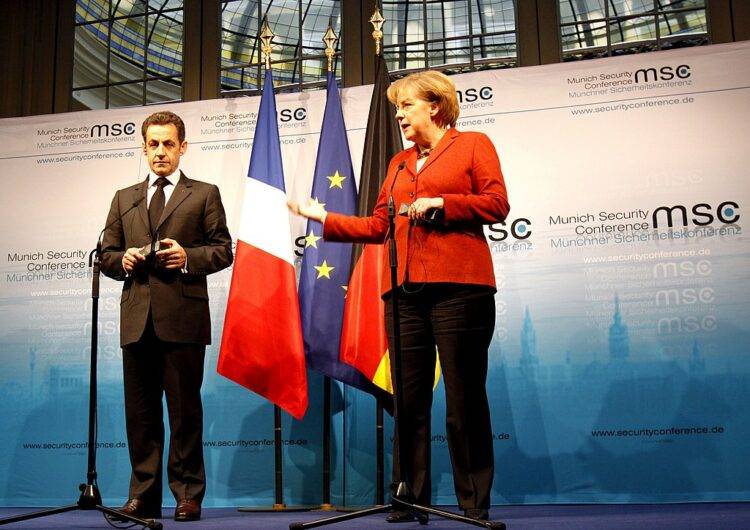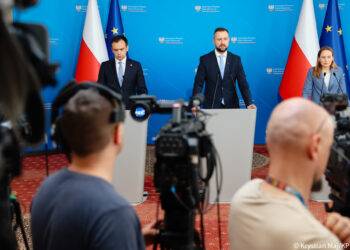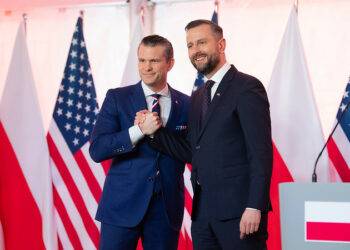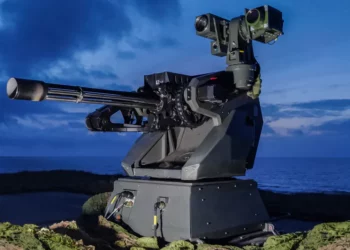As the Munich Security Conference draws near, with over 180 government representatives worldwide, including U.S. Vice President Kamala Harris and Secretary of State Antony Blinken, the spotlight turns to Poland’s exemplary defense investment. Christoph Heusgen, the head of the conference, highlighted Poland’s commitment to military spending as a model for Europe, emphasizing the importance of the Weimar Triangle—comprising Poland, Germany, and France—in driving European defense initiatives.
Amid discussions on global security and the dominant theme of Ukraine, Heusgen’s remarks about Poland come at a crucial time. The resurgence of the Weimar Triangle signifies a potential new dynamic in European defense collaboration, especially in response to criticisms from figures like Donald Trump about NATO countries’ contributions. Heusgen pointed out that the call for increased defense spending among NATO members is a longstanding issue, justified from the perspective of the average American taxpayer and underscored by the annexation of Crimea.
Heusgen’s commendation of Poland as a beacon for European defense investment reflects the broader agenda of reinforcing European security architecture in response to contemporary challenges, notably the ongoing crisis in Ukraine. Amid discussions on global security, economic affairs, climate change, and technological advancements, the emphasis on Poland’s defense spending strategy highlights the critical need for increased military readiness among European nations.
The Munich Security Conference, renowned for facilitating high-level diplomatic engagements, is poised to delve into the strategic imperatives of European defense cooperation, with the Weimar Triangle — an alliance between Poland, Germany, and France — playing a pivotal role. Heusgen’s remarks signal a rejuvenated momentum within the Triangle, suggesting a collective European endeavor to bolster defense capabilities in a landscape marked by geopolitical volatility.
The conference in Munich is set to address a broad range of topics, yet European security and the situation in Ukraine are expected to dominate the agenda. The role of the Weimar Triangle, according to Heusgen, could provide fresh momentum for Europe to start investing more heavily in its defense capabilities. This comes as European countries, led by examples like Poland, are urged to enhance their military readiness in the face of growing geopolitical challenges.
Heusgen’s diplomatic approach to recent controversial statements by Trump regarding NATO underscores the significance of the Munich conference as a platform for dialogue among leading global and European powers. With no representatives from the Kremlin, the conference will likely focus on strategies for peace and security in Ukraine, including a proposal reminiscent of the Minsk format aimed at de-escalating the conflict.
As Europe faces what Heusgen describes as a “political recession” with heightened global tensions, the Munich Security Conference represents a critical moment for discussing defense, unity, and the future of European security. Poland’s proactive stance on defense investment, highlighted against this backdrop, positions the country as a key player in shaping the continent’s strategic direction.
- Follow us on X (Twitter) to stay up to date with News from Poland.
As the Munich Security Conference draws near, with over 180 government representatives worldwide, including U.S. Vice President Kamala Harris and Secretary of State Antony Blinken, the spotlight turns to Poland’s exemplary defense investment. Christoph Heusgen, the head of the conference, highlighted Poland’s commitment to military spending as a model for Europe, emphasizing the importance of the Weimar Triangle—comprising Poland, Germany, and France—in driving European defense initiatives.
Amid discussions on global security and the dominant theme of Ukraine, Heusgen’s remarks about Poland come at a crucial time. The resurgence of the Weimar Triangle signifies a potential new dynamic in European defense collaboration, especially in response to criticisms from figures like Donald Trump about NATO countries’ contributions. Heusgen pointed out that the call for increased defense spending among NATO members is a longstanding issue, justified from the perspective of the average American taxpayer and underscored by the annexation of Crimea.
Heusgen’s commendation of Poland as a beacon for European defense investment reflects the broader agenda of reinforcing European security architecture in response to contemporary challenges, notably the ongoing crisis in Ukraine. Amid discussions on global security, economic affairs, climate change, and technological advancements, the emphasis on Poland’s defense spending strategy highlights the critical need for increased military readiness among European nations.
The Munich Security Conference, renowned for facilitating high-level diplomatic engagements, is poised to delve into the strategic imperatives of European defense cooperation, with the Weimar Triangle — an alliance between Poland, Germany, and France — playing a pivotal role. Heusgen’s remarks signal a rejuvenated momentum within the Triangle, suggesting a collective European endeavor to bolster defense capabilities in a landscape marked by geopolitical volatility.
The conference in Munich is set to address a broad range of topics, yet European security and the situation in Ukraine are expected to dominate the agenda. The role of the Weimar Triangle, according to Heusgen, could provide fresh momentum for Europe to start investing more heavily in its defense capabilities. This comes as European countries, led by examples like Poland, are urged to enhance their military readiness in the face of growing geopolitical challenges.
Heusgen’s diplomatic approach to recent controversial statements by Trump regarding NATO underscores the significance of the Munich conference as a platform for dialogue among leading global and European powers. With no representatives from the Kremlin, the conference will likely focus on strategies for peace and security in Ukraine, including a proposal reminiscent of the Minsk format aimed at de-escalating the conflict.
As Europe faces what Heusgen describes as a “political recession” with heightened global tensions, the Munich Security Conference represents a critical moment for discussing defense, unity, and the future of European security. Poland’s proactive stance on defense investment, highlighted against this backdrop, positions the country as a key player in shaping the continent’s strategic direction.
- Follow us on X (Twitter) to stay up to date with News from Poland.
As the Munich Security Conference draws near, with over 180 government representatives worldwide, including U.S. Vice President Kamala Harris and Secretary of State Antony Blinken, the spotlight turns to Poland’s exemplary defense investment. Christoph Heusgen, the head of the conference, highlighted Poland’s commitment to military spending as a model for Europe, emphasizing the importance of the Weimar Triangle—comprising Poland, Germany, and France—in driving European defense initiatives.
Amid discussions on global security and the dominant theme of Ukraine, Heusgen’s remarks about Poland come at a crucial time. The resurgence of the Weimar Triangle signifies a potential new dynamic in European defense collaboration, especially in response to criticisms from figures like Donald Trump about NATO countries’ contributions. Heusgen pointed out that the call for increased defense spending among NATO members is a longstanding issue, justified from the perspective of the average American taxpayer and underscored by the annexation of Crimea.
Heusgen’s commendation of Poland as a beacon for European defense investment reflects the broader agenda of reinforcing European security architecture in response to contemporary challenges, notably the ongoing crisis in Ukraine. Amid discussions on global security, economic affairs, climate change, and technological advancements, the emphasis on Poland’s defense spending strategy highlights the critical need for increased military readiness among European nations.
The Munich Security Conference, renowned for facilitating high-level diplomatic engagements, is poised to delve into the strategic imperatives of European defense cooperation, with the Weimar Triangle — an alliance between Poland, Germany, and France — playing a pivotal role. Heusgen’s remarks signal a rejuvenated momentum within the Triangle, suggesting a collective European endeavor to bolster defense capabilities in a landscape marked by geopolitical volatility.
The conference in Munich is set to address a broad range of topics, yet European security and the situation in Ukraine are expected to dominate the agenda. The role of the Weimar Triangle, according to Heusgen, could provide fresh momentum for Europe to start investing more heavily in its defense capabilities. This comes as European countries, led by examples like Poland, are urged to enhance their military readiness in the face of growing geopolitical challenges.
Heusgen’s diplomatic approach to recent controversial statements by Trump regarding NATO underscores the significance of the Munich conference as a platform for dialogue among leading global and European powers. With no representatives from the Kremlin, the conference will likely focus on strategies for peace and security in Ukraine, including a proposal reminiscent of the Minsk format aimed at de-escalating the conflict.
As Europe faces what Heusgen describes as a “political recession” with heightened global tensions, the Munich Security Conference represents a critical moment for discussing defense, unity, and the future of European security. Poland’s proactive stance on defense investment, highlighted against this backdrop, positions the country as a key player in shaping the continent’s strategic direction.
- Follow us on X (Twitter) to stay up to date with News from Poland.
As the Munich Security Conference draws near, with over 180 government representatives worldwide, including U.S. Vice President Kamala Harris and Secretary of State Antony Blinken, the spotlight turns to Poland’s exemplary defense investment. Christoph Heusgen, the head of the conference, highlighted Poland’s commitment to military spending as a model for Europe, emphasizing the importance of the Weimar Triangle—comprising Poland, Germany, and France—in driving European defense initiatives.
Amid discussions on global security and the dominant theme of Ukraine, Heusgen’s remarks about Poland come at a crucial time. The resurgence of the Weimar Triangle signifies a potential new dynamic in European defense collaboration, especially in response to criticisms from figures like Donald Trump about NATO countries’ contributions. Heusgen pointed out that the call for increased defense spending among NATO members is a longstanding issue, justified from the perspective of the average American taxpayer and underscored by the annexation of Crimea.
Heusgen’s commendation of Poland as a beacon for European defense investment reflects the broader agenda of reinforcing European security architecture in response to contemporary challenges, notably the ongoing crisis in Ukraine. Amid discussions on global security, economic affairs, climate change, and technological advancements, the emphasis on Poland’s defense spending strategy highlights the critical need for increased military readiness among European nations.
The Munich Security Conference, renowned for facilitating high-level diplomatic engagements, is poised to delve into the strategic imperatives of European defense cooperation, with the Weimar Triangle — an alliance between Poland, Germany, and France — playing a pivotal role. Heusgen’s remarks signal a rejuvenated momentum within the Triangle, suggesting a collective European endeavor to bolster defense capabilities in a landscape marked by geopolitical volatility.
The conference in Munich is set to address a broad range of topics, yet European security and the situation in Ukraine are expected to dominate the agenda. The role of the Weimar Triangle, according to Heusgen, could provide fresh momentum for Europe to start investing more heavily in its defense capabilities. This comes as European countries, led by examples like Poland, are urged to enhance their military readiness in the face of growing geopolitical challenges.
Heusgen’s diplomatic approach to recent controversial statements by Trump regarding NATO underscores the significance of the Munich conference as a platform for dialogue among leading global and European powers. With no representatives from the Kremlin, the conference will likely focus on strategies for peace and security in Ukraine, including a proposal reminiscent of the Minsk format aimed at de-escalating the conflict.
As Europe faces what Heusgen describes as a “political recession” with heightened global tensions, the Munich Security Conference represents a critical moment for discussing defense, unity, and the future of European security. Poland’s proactive stance on defense investment, highlighted against this backdrop, positions the country as a key player in shaping the continent’s strategic direction.
- Follow us on X (Twitter) to stay up to date with News from Poland.
As the Munich Security Conference draws near, with over 180 government representatives worldwide, including U.S. Vice President Kamala Harris and Secretary of State Antony Blinken, the spotlight turns to Poland’s exemplary defense investment. Christoph Heusgen, the head of the conference, highlighted Poland’s commitment to military spending as a model for Europe, emphasizing the importance of the Weimar Triangle—comprising Poland, Germany, and France—in driving European defense initiatives.
Amid discussions on global security and the dominant theme of Ukraine, Heusgen’s remarks about Poland come at a crucial time. The resurgence of the Weimar Triangle signifies a potential new dynamic in European defense collaboration, especially in response to criticisms from figures like Donald Trump about NATO countries’ contributions. Heusgen pointed out that the call for increased defense spending among NATO members is a longstanding issue, justified from the perspective of the average American taxpayer and underscored by the annexation of Crimea.
Heusgen’s commendation of Poland as a beacon for European defense investment reflects the broader agenda of reinforcing European security architecture in response to contemporary challenges, notably the ongoing crisis in Ukraine. Amid discussions on global security, economic affairs, climate change, and technological advancements, the emphasis on Poland’s defense spending strategy highlights the critical need for increased military readiness among European nations.
The Munich Security Conference, renowned for facilitating high-level diplomatic engagements, is poised to delve into the strategic imperatives of European defense cooperation, with the Weimar Triangle — an alliance between Poland, Germany, and France — playing a pivotal role. Heusgen’s remarks signal a rejuvenated momentum within the Triangle, suggesting a collective European endeavor to bolster defense capabilities in a landscape marked by geopolitical volatility.
The conference in Munich is set to address a broad range of topics, yet European security and the situation in Ukraine are expected to dominate the agenda. The role of the Weimar Triangle, according to Heusgen, could provide fresh momentum for Europe to start investing more heavily in its defense capabilities. This comes as European countries, led by examples like Poland, are urged to enhance their military readiness in the face of growing geopolitical challenges.
Heusgen’s diplomatic approach to recent controversial statements by Trump regarding NATO underscores the significance of the Munich conference as a platform for dialogue among leading global and European powers. With no representatives from the Kremlin, the conference will likely focus on strategies for peace and security in Ukraine, including a proposal reminiscent of the Minsk format aimed at de-escalating the conflict.
As Europe faces what Heusgen describes as a “political recession” with heightened global tensions, the Munich Security Conference represents a critical moment for discussing defense, unity, and the future of European security. Poland’s proactive stance on defense investment, highlighted against this backdrop, positions the country as a key player in shaping the continent’s strategic direction.
- Follow us on X (Twitter) to stay up to date with News from Poland.
As the Munich Security Conference draws near, with over 180 government representatives worldwide, including U.S. Vice President Kamala Harris and Secretary of State Antony Blinken, the spotlight turns to Poland’s exemplary defense investment. Christoph Heusgen, the head of the conference, highlighted Poland’s commitment to military spending as a model for Europe, emphasizing the importance of the Weimar Triangle—comprising Poland, Germany, and France—in driving European defense initiatives.
Amid discussions on global security and the dominant theme of Ukraine, Heusgen’s remarks about Poland come at a crucial time. The resurgence of the Weimar Triangle signifies a potential new dynamic in European defense collaboration, especially in response to criticisms from figures like Donald Trump about NATO countries’ contributions. Heusgen pointed out that the call for increased defense spending among NATO members is a longstanding issue, justified from the perspective of the average American taxpayer and underscored by the annexation of Crimea.
Heusgen’s commendation of Poland as a beacon for European defense investment reflects the broader agenda of reinforcing European security architecture in response to contemporary challenges, notably the ongoing crisis in Ukraine. Amid discussions on global security, economic affairs, climate change, and technological advancements, the emphasis on Poland’s defense spending strategy highlights the critical need for increased military readiness among European nations.
The Munich Security Conference, renowned for facilitating high-level diplomatic engagements, is poised to delve into the strategic imperatives of European defense cooperation, with the Weimar Triangle — an alliance between Poland, Germany, and France — playing a pivotal role. Heusgen’s remarks signal a rejuvenated momentum within the Triangle, suggesting a collective European endeavor to bolster defense capabilities in a landscape marked by geopolitical volatility.
The conference in Munich is set to address a broad range of topics, yet European security and the situation in Ukraine are expected to dominate the agenda. The role of the Weimar Triangle, according to Heusgen, could provide fresh momentum for Europe to start investing more heavily in its defense capabilities. This comes as European countries, led by examples like Poland, are urged to enhance their military readiness in the face of growing geopolitical challenges.
Heusgen’s diplomatic approach to recent controversial statements by Trump regarding NATO underscores the significance of the Munich conference as a platform for dialogue among leading global and European powers. With no representatives from the Kremlin, the conference will likely focus on strategies for peace and security in Ukraine, including a proposal reminiscent of the Minsk format aimed at de-escalating the conflict.
As Europe faces what Heusgen describes as a “political recession” with heightened global tensions, the Munich Security Conference represents a critical moment for discussing defense, unity, and the future of European security. Poland’s proactive stance on defense investment, highlighted against this backdrop, positions the country as a key player in shaping the continent’s strategic direction.
- Follow us on X (Twitter) to stay up to date with News from Poland.
As the Munich Security Conference draws near, with over 180 government representatives worldwide, including U.S. Vice President Kamala Harris and Secretary of State Antony Blinken, the spotlight turns to Poland’s exemplary defense investment. Christoph Heusgen, the head of the conference, highlighted Poland’s commitment to military spending as a model for Europe, emphasizing the importance of the Weimar Triangle—comprising Poland, Germany, and France—in driving European defense initiatives.
Amid discussions on global security and the dominant theme of Ukraine, Heusgen’s remarks about Poland come at a crucial time. The resurgence of the Weimar Triangle signifies a potential new dynamic in European defense collaboration, especially in response to criticisms from figures like Donald Trump about NATO countries’ contributions. Heusgen pointed out that the call for increased defense spending among NATO members is a longstanding issue, justified from the perspective of the average American taxpayer and underscored by the annexation of Crimea.
Heusgen’s commendation of Poland as a beacon for European defense investment reflects the broader agenda of reinforcing European security architecture in response to contemporary challenges, notably the ongoing crisis in Ukraine. Amid discussions on global security, economic affairs, climate change, and technological advancements, the emphasis on Poland’s defense spending strategy highlights the critical need for increased military readiness among European nations.
The Munich Security Conference, renowned for facilitating high-level diplomatic engagements, is poised to delve into the strategic imperatives of European defense cooperation, with the Weimar Triangle — an alliance between Poland, Germany, and France — playing a pivotal role. Heusgen’s remarks signal a rejuvenated momentum within the Triangle, suggesting a collective European endeavor to bolster defense capabilities in a landscape marked by geopolitical volatility.
The conference in Munich is set to address a broad range of topics, yet European security and the situation in Ukraine are expected to dominate the agenda. The role of the Weimar Triangle, according to Heusgen, could provide fresh momentum for Europe to start investing more heavily in its defense capabilities. This comes as European countries, led by examples like Poland, are urged to enhance their military readiness in the face of growing geopolitical challenges.
Heusgen’s diplomatic approach to recent controversial statements by Trump regarding NATO underscores the significance of the Munich conference as a platform for dialogue among leading global and European powers. With no representatives from the Kremlin, the conference will likely focus on strategies for peace and security in Ukraine, including a proposal reminiscent of the Minsk format aimed at de-escalating the conflict.
As Europe faces what Heusgen describes as a “political recession” with heightened global tensions, the Munich Security Conference represents a critical moment for discussing defense, unity, and the future of European security. Poland’s proactive stance on defense investment, highlighted against this backdrop, positions the country as a key player in shaping the continent’s strategic direction.
- Follow us on X (Twitter) to stay up to date with News from Poland.
As the Munich Security Conference draws near, with over 180 government representatives worldwide, including U.S. Vice President Kamala Harris and Secretary of State Antony Blinken, the spotlight turns to Poland’s exemplary defense investment. Christoph Heusgen, the head of the conference, highlighted Poland’s commitment to military spending as a model for Europe, emphasizing the importance of the Weimar Triangle—comprising Poland, Germany, and France—in driving European defense initiatives.
Amid discussions on global security and the dominant theme of Ukraine, Heusgen’s remarks about Poland come at a crucial time. The resurgence of the Weimar Triangle signifies a potential new dynamic in European defense collaboration, especially in response to criticisms from figures like Donald Trump about NATO countries’ contributions. Heusgen pointed out that the call for increased defense spending among NATO members is a longstanding issue, justified from the perspective of the average American taxpayer and underscored by the annexation of Crimea.
Heusgen’s commendation of Poland as a beacon for European defense investment reflects the broader agenda of reinforcing European security architecture in response to contemporary challenges, notably the ongoing crisis in Ukraine. Amid discussions on global security, economic affairs, climate change, and technological advancements, the emphasis on Poland’s defense spending strategy highlights the critical need for increased military readiness among European nations.
The Munich Security Conference, renowned for facilitating high-level diplomatic engagements, is poised to delve into the strategic imperatives of European defense cooperation, with the Weimar Triangle — an alliance between Poland, Germany, and France — playing a pivotal role. Heusgen’s remarks signal a rejuvenated momentum within the Triangle, suggesting a collective European endeavor to bolster defense capabilities in a landscape marked by geopolitical volatility.
The conference in Munich is set to address a broad range of topics, yet European security and the situation in Ukraine are expected to dominate the agenda. The role of the Weimar Triangle, according to Heusgen, could provide fresh momentum for Europe to start investing more heavily in its defense capabilities. This comes as European countries, led by examples like Poland, are urged to enhance their military readiness in the face of growing geopolitical challenges.
Heusgen’s diplomatic approach to recent controversial statements by Trump regarding NATO underscores the significance of the Munich conference as a platform for dialogue among leading global and European powers. With no representatives from the Kremlin, the conference will likely focus on strategies for peace and security in Ukraine, including a proposal reminiscent of the Minsk format aimed at de-escalating the conflict.
As Europe faces what Heusgen describes as a “political recession” with heightened global tensions, the Munich Security Conference represents a critical moment for discussing defense, unity, and the future of European security. Poland’s proactive stance on defense investment, highlighted against this backdrop, positions the country as a key player in shaping the continent’s strategic direction.
- Follow us on X (Twitter) to stay up to date with News from Poland.
As the Munich Security Conference draws near, with over 180 government representatives worldwide, including U.S. Vice President Kamala Harris and Secretary of State Antony Blinken, the spotlight turns to Poland’s exemplary defense investment. Christoph Heusgen, the head of the conference, highlighted Poland’s commitment to military spending as a model for Europe, emphasizing the importance of the Weimar Triangle—comprising Poland, Germany, and France—in driving European defense initiatives.
Amid discussions on global security and the dominant theme of Ukraine, Heusgen’s remarks about Poland come at a crucial time. The resurgence of the Weimar Triangle signifies a potential new dynamic in European defense collaboration, especially in response to criticisms from figures like Donald Trump about NATO countries’ contributions. Heusgen pointed out that the call for increased defense spending among NATO members is a longstanding issue, justified from the perspective of the average American taxpayer and underscored by the annexation of Crimea.
Heusgen’s commendation of Poland as a beacon for European defense investment reflects the broader agenda of reinforcing European security architecture in response to contemporary challenges, notably the ongoing crisis in Ukraine. Amid discussions on global security, economic affairs, climate change, and technological advancements, the emphasis on Poland’s defense spending strategy highlights the critical need for increased military readiness among European nations.
The Munich Security Conference, renowned for facilitating high-level diplomatic engagements, is poised to delve into the strategic imperatives of European defense cooperation, with the Weimar Triangle — an alliance between Poland, Germany, and France — playing a pivotal role. Heusgen’s remarks signal a rejuvenated momentum within the Triangle, suggesting a collective European endeavor to bolster defense capabilities in a landscape marked by geopolitical volatility.
The conference in Munich is set to address a broad range of topics, yet European security and the situation in Ukraine are expected to dominate the agenda. The role of the Weimar Triangle, according to Heusgen, could provide fresh momentum for Europe to start investing more heavily in its defense capabilities. This comes as European countries, led by examples like Poland, are urged to enhance their military readiness in the face of growing geopolitical challenges.
Heusgen’s diplomatic approach to recent controversial statements by Trump regarding NATO underscores the significance of the Munich conference as a platform for dialogue among leading global and European powers. With no representatives from the Kremlin, the conference will likely focus on strategies for peace and security in Ukraine, including a proposal reminiscent of the Minsk format aimed at de-escalating the conflict.
As Europe faces what Heusgen describes as a “political recession” with heightened global tensions, the Munich Security Conference represents a critical moment for discussing defense, unity, and the future of European security. Poland’s proactive stance on defense investment, highlighted against this backdrop, positions the country as a key player in shaping the continent’s strategic direction.
- Follow us on X (Twitter) to stay up to date with News from Poland.
As the Munich Security Conference draws near, with over 180 government representatives worldwide, including U.S. Vice President Kamala Harris and Secretary of State Antony Blinken, the spotlight turns to Poland’s exemplary defense investment. Christoph Heusgen, the head of the conference, highlighted Poland’s commitment to military spending as a model for Europe, emphasizing the importance of the Weimar Triangle—comprising Poland, Germany, and France—in driving European defense initiatives.
Amid discussions on global security and the dominant theme of Ukraine, Heusgen’s remarks about Poland come at a crucial time. The resurgence of the Weimar Triangle signifies a potential new dynamic in European defense collaboration, especially in response to criticisms from figures like Donald Trump about NATO countries’ contributions. Heusgen pointed out that the call for increased defense spending among NATO members is a longstanding issue, justified from the perspective of the average American taxpayer and underscored by the annexation of Crimea.
Heusgen’s commendation of Poland as a beacon for European defense investment reflects the broader agenda of reinforcing European security architecture in response to contemporary challenges, notably the ongoing crisis in Ukraine. Amid discussions on global security, economic affairs, climate change, and technological advancements, the emphasis on Poland’s defense spending strategy highlights the critical need for increased military readiness among European nations.
The Munich Security Conference, renowned for facilitating high-level diplomatic engagements, is poised to delve into the strategic imperatives of European defense cooperation, with the Weimar Triangle — an alliance between Poland, Germany, and France — playing a pivotal role. Heusgen’s remarks signal a rejuvenated momentum within the Triangle, suggesting a collective European endeavor to bolster defense capabilities in a landscape marked by geopolitical volatility.
The conference in Munich is set to address a broad range of topics, yet European security and the situation in Ukraine are expected to dominate the agenda. The role of the Weimar Triangle, according to Heusgen, could provide fresh momentum for Europe to start investing more heavily in its defense capabilities. This comes as European countries, led by examples like Poland, are urged to enhance their military readiness in the face of growing geopolitical challenges.
Heusgen’s diplomatic approach to recent controversial statements by Trump regarding NATO underscores the significance of the Munich conference as a platform for dialogue among leading global and European powers. With no representatives from the Kremlin, the conference will likely focus on strategies for peace and security in Ukraine, including a proposal reminiscent of the Minsk format aimed at de-escalating the conflict.
As Europe faces what Heusgen describes as a “political recession” with heightened global tensions, the Munich Security Conference represents a critical moment for discussing defense, unity, and the future of European security. Poland’s proactive stance on defense investment, highlighted against this backdrop, positions the country as a key player in shaping the continent’s strategic direction.
- Follow us on X (Twitter) to stay up to date with News from Poland.
As the Munich Security Conference draws near, with over 180 government representatives worldwide, including U.S. Vice President Kamala Harris and Secretary of State Antony Blinken, the spotlight turns to Poland’s exemplary defense investment. Christoph Heusgen, the head of the conference, highlighted Poland’s commitment to military spending as a model for Europe, emphasizing the importance of the Weimar Triangle—comprising Poland, Germany, and France—in driving European defense initiatives.
Amid discussions on global security and the dominant theme of Ukraine, Heusgen’s remarks about Poland come at a crucial time. The resurgence of the Weimar Triangle signifies a potential new dynamic in European defense collaboration, especially in response to criticisms from figures like Donald Trump about NATO countries’ contributions. Heusgen pointed out that the call for increased defense spending among NATO members is a longstanding issue, justified from the perspective of the average American taxpayer and underscored by the annexation of Crimea.
Heusgen’s commendation of Poland as a beacon for European defense investment reflects the broader agenda of reinforcing European security architecture in response to contemporary challenges, notably the ongoing crisis in Ukraine. Amid discussions on global security, economic affairs, climate change, and technological advancements, the emphasis on Poland’s defense spending strategy highlights the critical need for increased military readiness among European nations.
The Munich Security Conference, renowned for facilitating high-level diplomatic engagements, is poised to delve into the strategic imperatives of European defense cooperation, with the Weimar Triangle — an alliance between Poland, Germany, and France — playing a pivotal role. Heusgen’s remarks signal a rejuvenated momentum within the Triangle, suggesting a collective European endeavor to bolster defense capabilities in a landscape marked by geopolitical volatility.
The conference in Munich is set to address a broad range of topics, yet European security and the situation in Ukraine are expected to dominate the agenda. The role of the Weimar Triangle, according to Heusgen, could provide fresh momentum for Europe to start investing more heavily in its defense capabilities. This comes as European countries, led by examples like Poland, are urged to enhance their military readiness in the face of growing geopolitical challenges.
Heusgen’s diplomatic approach to recent controversial statements by Trump regarding NATO underscores the significance of the Munich conference as a platform for dialogue among leading global and European powers. With no representatives from the Kremlin, the conference will likely focus on strategies for peace and security in Ukraine, including a proposal reminiscent of the Minsk format aimed at de-escalating the conflict.
As Europe faces what Heusgen describes as a “political recession” with heightened global tensions, the Munich Security Conference represents a critical moment for discussing defense, unity, and the future of European security. Poland’s proactive stance on defense investment, highlighted against this backdrop, positions the country as a key player in shaping the continent’s strategic direction.
- Follow us on X (Twitter) to stay up to date with News from Poland.
As the Munich Security Conference draws near, with over 180 government representatives worldwide, including U.S. Vice President Kamala Harris and Secretary of State Antony Blinken, the spotlight turns to Poland’s exemplary defense investment. Christoph Heusgen, the head of the conference, highlighted Poland’s commitment to military spending as a model for Europe, emphasizing the importance of the Weimar Triangle—comprising Poland, Germany, and France—in driving European defense initiatives.
Amid discussions on global security and the dominant theme of Ukraine, Heusgen’s remarks about Poland come at a crucial time. The resurgence of the Weimar Triangle signifies a potential new dynamic in European defense collaboration, especially in response to criticisms from figures like Donald Trump about NATO countries’ contributions. Heusgen pointed out that the call for increased defense spending among NATO members is a longstanding issue, justified from the perspective of the average American taxpayer and underscored by the annexation of Crimea.
Heusgen’s commendation of Poland as a beacon for European defense investment reflects the broader agenda of reinforcing European security architecture in response to contemporary challenges, notably the ongoing crisis in Ukraine. Amid discussions on global security, economic affairs, climate change, and technological advancements, the emphasis on Poland’s defense spending strategy highlights the critical need for increased military readiness among European nations.
The Munich Security Conference, renowned for facilitating high-level diplomatic engagements, is poised to delve into the strategic imperatives of European defense cooperation, with the Weimar Triangle — an alliance between Poland, Germany, and France — playing a pivotal role. Heusgen’s remarks signal a rejuvenated momentum within the Triangle, suggesting a collective European endeavor to bolster defense capabilities in a landscape marked by geopolitical volatility.
The conference in Munich is set to address a broad range of topics, yet European security and the situation in Ukraine are expected to dominate the agenda. The role of the Weimar Triangle, according to Heusgen, could provide fresh momentum for Europe to start investing more heavily in its defense capabilities. This comes as European countries, led by examples like Poland, are urged to enhance their military readiness in the face of growing geopolitical challenges.
Heusgen’s diplomatic approach to recent controversial statements by Trump regarding NATO underscores the significance of the Munich conference as a platform for dialogue among leading global and European powers. With no representatives from the Kremlin, the conference will likely focus on strategies for peace and security in Ukraine, including a proposal reminiscent of the Minsk format aimed at de-escalating the conflict.
As Europe faces what Heusgen describes as a “political recession” with heightened global tensions, the Munich Security Conference represents a critical moment for discussing defense, unity, and the future of European security. Poland’s proactive stance on defense investment, highlighted against this backdrop, positions the country as a key player in shaping the continent’s strategic direction.
- Follow us on X (Twitter) to stay up to date with News from Poland.
As the Munich Security Conference draws near, with over 180 government representatives worldwide, including U.S. Vice President Kamala Harris and Secretary of State Antony Blinken, the spotlight turns to Poland’s exemplary defense investment. Christoph Heusgen, the head of the conference, highlighted Poland’s commitment to military spending as a model for Europe, emphasizing the importance of the Weimar Triangle—comprising Poland, Germany, and France—in driving European defense initiatives.
Amid discussions on global security and the dominant theme of Ukraine, Heusgen’s remarks about Poland come at a crucial time. The resurgence of the Weimar Triangle signifies a potential new dynamic in European defense collaboration, especially in response to criticisms from figures like Donald Trump about NATO countries’ contributions. Heusgen pointed out that the call for increased defense spending among NATO members is a longstanding issue, justified from the perspective of the average American taxpayer and underscored by the annexation of Crimea.
Heusgen’s commendation of Poland as a beacon for European defense investment reflects the broader agenda of reinforcing European security architecture in response to contemporary challenges, notably the ongoing crisis in Ukraine. Amid discussions on global security, economic affairs, climate change, and technological advancements, the emphasis on Poland’s defense spending strategy highlights the critical need for increased military readiness among European nations.
The Munich Security Conference, renowned for facilitating high-level diplomatic engagements, is poised to delve into the strategic imperatives of European defense cooperation, with the Weimar Triangle — an alliance between Poland, Germany, and France — playing a pivotal role. Heusgen’s remarks signal a rejuvenated momentum within the Triangle, suggesting a collective European endeavor to bolster defense capabilities in a landscape marked by geopolitical volatility.
The conference in Munich is set to address a broad range of topics, yet European security and the situation in Ukraine are expected to dominate the agenda. The role of the Weimar Triangle, according to Heusgen, could provide fresh momentum for Europe to start investing more heavily in its defense capabilities. This comes as European countries, led by examples like Poland, are urged to enhance their military readiness in the face of growing geopolitical challenges.
Heusgen’s diplomatic approach to recent controversial statements by Trump regarding NATO underscores the significance of the Munich conference as a platform for dialogue among leading global and European powers. With no representatives from the Kremlin, the conference will likely focus on strategies for peace and security in Ukraine, including a proposal reminiscent of the Minsk format aimed at de-escalating the conflict.
As Europe faces what Heusgen describes as a “political recession” with heightened global tensions, the Munich Security Conference represents a critical moment for discussing defense, unity, and the future of European security. Poland’s proactive stance on defense investment, highlighted against this backdrop, positions the country as a key player in shaping the continent’s strategic direction.
- Follow us on X (Twitter) to stay up to date with News from Poland.
As the Munich Security Conference draws near, with over 180 government representatives worldwide, including U.S. Vice President Kamala Harris and Secretary of State Antony Blinken, the spotlight turns to Poland’s exemplary defense investment. Christoph Heusgen, the head of the conference, highlighted Poland’s commitment to military spending as a model for Europe, emphasizing the importance of the Weimar Triangle—comprising Poland, Germany, and France—in driving European defense initiatives.
Amid discussions on global security and the dominant theme of Ukraine, Heusgen’s remarks about Poland come at a crucial time. The resurgence of the Weimar Triangle signifies a potential new dynamic in European defense collaboration, especially in response to criticisms from figures like Donald Trump about NATO countries’ contributions. Heusgen pointed out that the call for increased defense spending among NATO members is a longstanding issue, justified from the perspective of the average American taxpayer and underscored by the annexation of Crimea.
Heusgen’s commendation of Poland as a beacon for European defense investment reflects the broader agenda of reinforcing European security architecture in response to contemporary challenges, notably the ongoing crisis in Ukraine. Amid discussions on global security, economic affairs, climate change, and technological advancements, the emphasis on Poland’s defense spending strategy highlights the critical need for increased military readiness among European nations.
The Munich Security Conference, renowned for facilitating high-level diplomatic engagements, is poised to delve into the strategic imperatives of European defense cooperation, with the Weimar Triangle — an alliance between Poland, Germany, and France — playing a pivotal role. Heusgen’s remarks signal a rejuvenated momentum within the Triangle, suggesting a collective European endeavor to bolster defense capabilities in a landscape marked by geopolitical volatility.
The conference in Munich is set to address a broad range of topics, yet European security and the situation in Ukraine are expected to dominate the agenda. The role of the Weimar Triangle, according to Heusgen, could provide fresh momentum for Europe to start investing more heavily in its defense capabilities. This comes as European countries, led by examples like Poland, are urged to enhance their military readiness in the face of growing geopolitical challenges.
Heusgen’s diplomatic approach to recent controversial statements by Trump regarding NATO underscores the significance of the Munich conference as a platform for dialogue among leading global and European powers. With no representatives from the Kremlin, the conference will likely focus on strategies for peace and security in Ukraine, including a proposal reminiscent of the Minsk format aimed at de-escalating the conflict.
As Europe faces what Heusgen describes as a “political recession” with heightened global tensions, the Munich Security Conference represents a critical moment for discussing defense, unity, and the future of European security. Poland’s proactive stance on defense investment, highlighted against this backdrop, positions the country as a key player in shaping the continent’s strategic direction.
- Follow us on X (Twitter) to stay up to date with News from Poland.
As the Munich Security Conference draws near, with over 180 government representatives worldwide, including U.S. Vice President Kamala Harris and Secretary of State Antony Blinken, the spotlight turns to Poland’s exemplary defense investment. Christoph Heusgen, the head of the conference, highlighted Poland’s commitment to military spending as a model for Europe, emphasizing the importance of the Weimar Triangle—comprising Poland, Germany, and France—in driving European defense initiatives.
Amid discussions on global security and the dominant theme of Ukraine, Heusgen’s remarks about Poland come at a crucial time. The resurgence of the Weimar Triangle signifies a potential new dynamic in European defense collaboration, especially in response to criticisms from figures like Donald Trump about NATO countries’ contributions. Heusgen pointed out that the call for increased defense spending among NATO members is a longstanding issue, justified from the perspective of the average American taxpayer and underscored by the annexation of Crimea.
Heusgen’s commendation of Poland as a beacon for European defense investment reflects the broader agenda of reinforcing European security architecture in response to contemporary challenges, notably the ongoing crisis in Ukraine. Amid discussions on global security, economic affairs, climate change, and technological advancements, the emphasis on Poland’s defense spending strategy highlights the critical need for increased military readiness among European nations.
The Munich Security Conference, renowned for facilitating high-level diplomatic engagements, is poised to delve into the strategic imperatives of European defense cooperation, with the Weimar Triangle — an alliance between Poland, Germany, and France — playing a pivotal role. Heusgen’s remarks signal a rejuvenated momentum within the Triangle, suggesting a collective European endeavor to bolster defense capabilities in a landscape marked by geopolitical volatility.
The conference in Munich is set to address a broad range of topics, yet European security and the situation in Ukraine are expected to dominate the agenda. The role of the Weimar Triangle, according to Heusgen, could provide fresh momentum for Europe to start investing more heavily in its defense capabilities. This comes as European countries, led by examples like Poland, are urged to enhance their military readiness in the face of growing geopolitical challenges.
Heusgen’s diplomatic approach to recent controversial statements by Trump regarding NATO underscores the significance of the Munich conference as a platform for dialogue among leading global and European powers. With no representatives from the Kremlin, the conference will likely focus on strategies for peace and security in Ukraine, including a proposal reminiscent of the Minsk format aimed at de-escalating the conflict.
As Europe faces what Heusgen describes as a “political recession” with heightened global tensions, the Munich Security Conference represents a critical moment for discussing defense, unity, and the future of European security. Poland’s proactive stance on defense investment, highlighted against this backdrop, positions the country as a key player in shaping the continent’s strategic direction.
- Follow us on X (Twitter) to stay up to date with News from Poland.
As the Munich Security Conference draws near, with over 180 government representatives worldwide, including U.S. Vice President Kamala Harris and Secretary of State Antony Blinken, the spotlight turns to Poland’s exemplary defense investment. Christoph Heusgen, the head of the conference, highlighted Poland’s commitment to military spending as a model for Europe, emphasizing the importance of the Weimar Triangle—comprising Poland, Germany, and France—in driving European defense initiatives.
Amid discussions on global security and the dominant theme of Ukraine, Heusgen’s remarks about Poland come at a crucial time. The resurgence of the Weimar Triangle signifies a potential new dynamic in European defense collaboration, especially in response to criticisms from figures like Donald Trump about NATO countries’ contributions. Heusgen pointed out that the call for increased defense spending among NATO members is a longstanding issue, justified from the perspective of the average American taxpayer and underscored by the annexation of Crimea.
Heusgen’s commendation of Poland as a beacon for European defense investment reflects the broader agenda of reinforcing European security architecture in response to contemporary challenges, notably the ongoing crisis in Ukraine. Amid discussions on global security, economic affairs, climate change, and technological advancements, the emphasis on Poland’s defense spending strategy highlights the critical need for increased military readiness among European nations.
The Munich Security Conference, renowned for facilitating high-level diplomatic engagements, is poised to delve into the strategic imperatives of European defense cooperation, with the Weimar Triangle — an alliance between Poland, Germany, and France — playing a pivotal role. Heusgen’s remarks signal a rejuvenated momentum within the Triangle, suggesting a collective European endeavor to bolster defense capabilities in a landscape marked by geopolitical volatility.
The conference in Munich is set to address a broad range of topics, yet European security and the situation in Ukraine are expected to dominate the agenda. The role of the Weimar Triangle, according to Heusgen, could provide fresh momentum for Europe to start investing more heavily in its defense capabilities. This comes as European countries, led by examples like Poland, are urged to enhance their military readiness in the face of growing geopolitical challenges.
Heusgen’s diplomatic approach to recent controversial statements by Trump regarding NATO underscores the significance of the Munich conference as a platform for dialogue among leading global and European powers. With no representatives from the Kremlin, the conference will likely focus on strategies for peace and security in Ukraine, including a proposal reminiscent of the Minsk format aimed at de-escalating the conflict.
As Europe faces what Heusgen describes as a “political recession” with heightened global tensions, the Munich Security Conference represents a critical moment for discussing defense, unity, and the future of European security. Poland’s proactive stance on defense investment, highlighted against this backdrop, positions the country as a key player in shaping the continent’s strategic direction.
- Follow us on X (Twitter) to stay up to date with News from Poland.


















